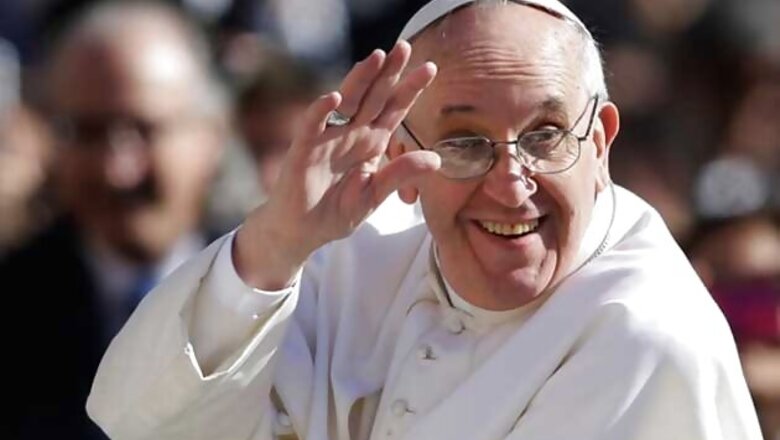
views
Vatican City: In a jubilant moment for the Christian community in India, two beatified candidates from Kerala, Fr Kuriakose Elias Chavara and Sister Euphrasia, will be conferred sainthood by Pope Francis at Vatican on Sunday.
With their canonisation, as the finale of the long-drawn stage-by-stage process is known in Catholic parlance, the centuries-old Syro Malabar Church will have three saints, the first being Sister Alphonsa, raised to the revered rank in 2008.
According to Church sources, the Pope will declare Chavara and Euphrasia as saints during a special mass at St Peter's Square at Vatican on Sunday.
A large number of devotees, two Cardinals and clergy and nuns from Kerala have already left for Vatican to witness the event. Special prayers will also be held in Catholic churches across the state to mark the occasion.
Two places closely associated to the lives of Chavara and Euprhasia, at Mannman in Kottayam and Ollur in Thrissur respectively, have already been in the grip of spiritual fervour for the last several days.
Who is Kuriakose Elias Chavara?
Chavara is reckoned as a social reformer and visionary priest. He as declared blessed in 1986 along with sister Alphonsa, who was made a saint in 2008. He has been credited with introducing reforms in the Syrian Catholic Church. He popularized the Sunday sermon and retreat for laymen; founded the first Indian congregation for men, the Carmelites of Mary Immaculate, and for women, the Carmelites of Mother Carmel (CMC).
He started the first printing press at his monastery at Mannanam in Kottayam, which went on to bring out the first Malayalam daily, Nasrani Deepika. His pioneering contribution to society was "School along with Church" - in 1864, he decreed that every church must have a school. The practice continues to this day. Chavara also started a special school for the weaker sections.
Who is Sister Euphrasia?
Lived in the 19th and 20th centuries, and led a life dedicated to prayer and sufferings. She was a member of the Congregation of the Mother Carmel established by Chavara in 1866. She was born in 1877 at Katoor in Thrissur district in a rich family, and was known as Rose before becoming a nun. She joined the CMC and became a nun in 1898, and took the name Euphrasia. She led her life mostly in the convent chapel at Ollur in Thrissur, and was called the praying mother and known as a living saint among the nuns. The frequent letters she wrote to her spiritual father Bishop John Menachery shed light on her life. "There was not a single day in by life not to be afflicted for God," was one of her prayers. She died in 1952 at age 75, and was buried at Ollur. Years later, the tomb of the nun, who prayed for a silent and secluded life, turned to a pilgrim centre. Several miracles were reported from the faithful through heavenly intercession of Euphrasia.
How does one become a saint?
Before a person can be considered for sainthood, he/she must have been dead for at least 5 years. (Pope John Paul II waived this requirement in Mother Teresa's case.)
First step: When the subject arises that a person should be considered for sainthood, a Bishop is placed in charge of the initial investigation of the person's life. If it is determined that the candidate is deemed worthy of further consideration, the Vatican grants a "Nihil Obstat." This is a Latin phrase that means "nothing hinders." Henceforth, the candidate is called a "Servant of God."
Second step: The Church official, a Postulator, who coordinates the process and serves as an advocate, must prove that the candidate lived heroic virtues. This is achieved through the collection of documents and testimonies that are collected and presented to the Congregation for the Causes of Saints in Rome. When a candidate is approved, he/she earns the title of "Venerable."
Third step: To be beatified and recognized as a "Blessed," one miracle acquired through the candidate's intercession is required in addition to recognition of heroic virtue (or martyrdom in the case of a martyr).
Fourth step: Canonization requires a second miracle after beatification, though a Pope may waive these requirements. (A miracle is not required prior to a martyr's beatification, but one is required before his/her canonization.) Once this second miracle has been received through the candidate's intercession, the Pope declares the person a "Saint."


















Comments
0 comment